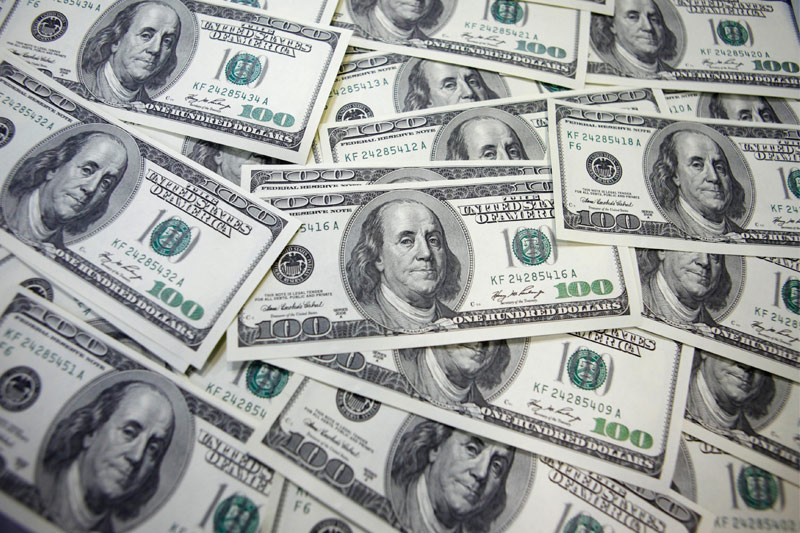Investing.com’s stocks of the week
Investing.com - The U.S. dollar rallied to a 20-month high against the yen on Wednesday, but was mostly steady against the other major currencies amid a lack of fresh cues as most global markets remained closed for the Christmas break.
During European morning trade, the dollar was higher against the yen, with USD/JPY rising 0.54% to trade at 84.33, the strongest level since April 2011.
Shinzo Abe was formally approved as Japan’s prime minister by the lower house of parliament earlier in the day.
Abe has recently called for unlimited easing by the Bank of Japan in order to weaken the local currency and spur growth in the recession-hit economy.
In addition, minutes from the BoJ’s November policy-setting meeting showed that some monetary-policy committee members said measures should be adjusted to further weaken the yen in the foreign-exchange market.
Meanwhile, the greenback eased down slightly against the euro and the pound, with EUR/USD adding 0.13% to 1.3210 and GBP/USD up 0.09% to hit 1.6134.
Financial markets in Europe and London remained closed for the Christmas break, resulting in low trade volumes.
The greenback was also modestly lower against the Swiss franc, with USD/CHF slipping 0.12% to 0.9142.
Elsewhere, the U.S. dollar was mixed against its Canadian, Australian and New Zealand counterparts, with USD/CAD adding 0.2% to 0.9933, AUD/USD inching 0.01% higher to 1.0365 and NZD/USD shedding 0.22% to 0.8206.
Markets in Australia and New Zealand remained shut in observance of Boxing Day.
The dollar index, which tracks the performance of the greenback versus a basket of six other major currencies, was up 0.13% to 79.74.
Market players remained focused on developments surrounding the fiscal cliff in the U.S., approximately USD600 billion in automatic tax hikes and spending cuts due to come into effect on January 1.
President Barack Obama, currently vacationing in Hawaii, plans to return to Washington on Thursday in order to take part in talks to avert the crisis ahead of the year-end deadline, the White House said late Tuesday.
Both chambers of Congress are also due to return to work on Thursday.
Without a deal, the U.S. could fall back into recession and drag much of the world down with it.
The U.S. is to publish industry data on house price inflation as well as a report on manufacturing activity in Richmond later in the trading day.
Trading volumes are expected to remain light because many investors have closed books to lock in profit before the end of the year, reducing liquidity in the market and increasing the volatility.
During European morning trade, the dollar was higher against the yen, with USD/JPY rising 0.54% to trade at 84.33, the strongest level since April 2011.
Shinzo Abe was formally approved as Japan’s prime minister by the lower house of parliament earlier in the day.
Abe has recently called for unlimited easing by the Bank of Japan in order to weaken the local currency and spur growth in the recession-hit economy.
In addition, minutes from the BoJ’s November policy-setting meeting showed that some monetary-policy committee members said measures should be adjusted to further weaken the yen in the foreign-exchange market.
Meanwhile, the greenback eased down slightly against the euro and the pound, with EUR/USD adding 0.13% to 1.3210 and GBP/USD up 0.09% to hit 1.6134.
Financial markets in Europe and London remained closed for the Christmas break, resulting in low trade volumes.
The greenback was also modestly lower against the Swiss franc, with USD/CHF slipping 0.12% to 0.9142.
Elsewhere, the U.S. dollar was mixed against its Canadian, Australian and New Zealand counterparts, with USD/CAD adding 0.2% to 0.9933, AUD/USD inching 0.01% higher to 1.0365 and NZD/USD shedding 0.22% to 0.8206.
Markets in Australia and New Zealand remained shut in observance of Boxing Day.
The dollar index, which tracks the performance of the greenback versus a basket of six other major currencies, was up 0.13% to 79.74.
Market players remained focused on developments surrounding the fiscal cliff in the U.S., approximately USD600 billion in automatic tax hikes and spending cuts due to come into effect on January 1.
President Barack Obama, currently vacationing in Hawaii, plans to return to Washington on Thursday in order to take part in talks to avert the crisis ahead of the year-end deadline, the White House said late Tuesday.
Both chambers of Congress are also due to return to work on Thursday.
Without a deal, the U.S. could fall back into recession and drag much of the world down with it.
The U.S. is to publish industry data on house price inflation as well as a report on manufacturing activity in Richmond later in the trading day.
Trading volumes are expected to remain light because many investors have closed books to lock in profit before the end of the year, reducing liquidity in the market and increasing the volatility.
